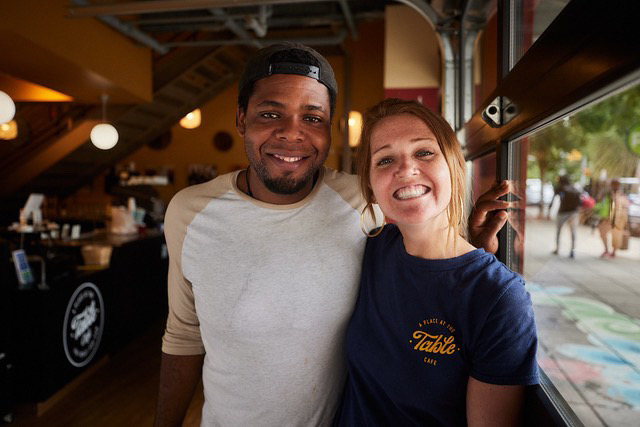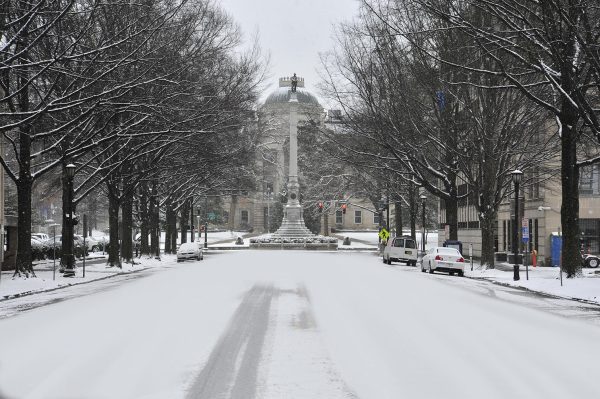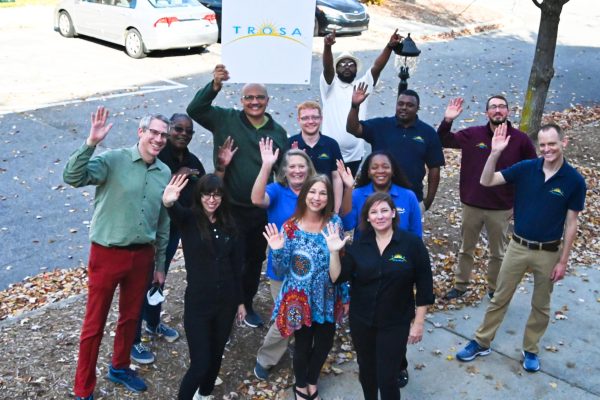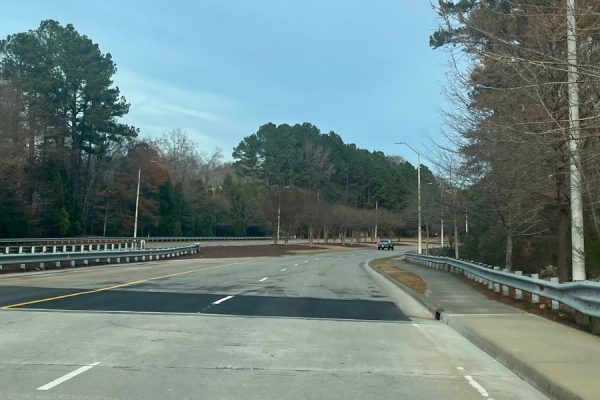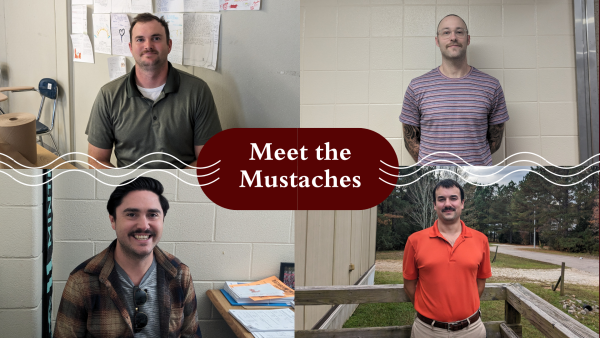Meet Maggie Kane: WHS alumna and founder of Raleigh’s first pay-what-you-can cafe
Photo Courtesy of Maggie Kane.
Maggie Kane, pictured right, smiles with a volunteer at A Place at the Table cafe in downtown Raleigh.
Nearly seven years ago, on her 25th birthday, Wakefield High School alumna Maggie Kane anxiously sat in the waiting room at the Secretary of State office in downtown Raleigh. For Kane, months of intensive research, community outreach, fundraising and tedious paperwork all culminated in the next half an hour as she awaited the non-profit status of her big idea. What Kane didn’t realize was that in 30 minutes, she would walk out of that same office as the founder and executive director of Raleigh’s first pay-what-you-can café – and would forever change the lives of those experiencing poverty in the Raleigh community.
Wakefield Roots
During her time as a student at Wakefield, Kane had no plans to stay in North Carolina – or the United States of America, for that matter.
“I kept having this draw to move abroad,” Kane said. “I was a part of a study abroad program [at Wakefield] where I lived in Italy for eight months during my junior year of high school.”
Following her graduation from Wakefield in 2009, Kane headed to North Carolina State University (NCSU), where she majored in Italian and International Relations. Though she was still set on moving to Italy following her college graduation, Kane joined a service fraternity at NCSU. Despite being a Raleigh native, it was through this service fraternity that Kane became familiar with non-profit work, and was first exposed to the conditions of those experiencing food insecurity in the community.
“One weekend we were handing out breakfast at Moore Square to [the homeless community] and we were told that we were no longer allowed to serve breakfast there because we had to have a permit,” Kane said. “We got kicked out of the park, and that is when I started to witness that poor people were getting pushed out of downtown Raleigh, and Raleigh was starting to gentrify.”
Following the incident at Moore Square, Kane decided to put her plans of moving abroad on hold. She acknowledges the shift that began to take place within the community.
“Raleigh was becoming a place where people with money thrive, and people without money don’t,” Kane said. “I wanted a place where all folks [of different backgrounds] could come together, and I hadn’t seen that exist [in Raleigh] yet. I realized that I needed to stay here for a while.”
The Climb
Following her graduation from NCSU in 2013, Kane went straight to work on establishing a place where everyone, regardless of means, could gather. She began researching, from social enterprises to churches to non-profits, and finally, found the pay-what-you-can model. The nearest pay-what-you-can restaurant was located in Boone, N.C., and after multiple trips to that cafe, Kane decided to take on the challenge of founding a similar cafe for the Raleigh community.
“I said, ‘If Boone can do it, Raleigh can too,” Kane said.
However, the road to establishing the cafe was not one that was easy. After applying as a Limited Liability Company, and getting denied, the process was seemingly becoming desultory. It was at this point that Kane realized she needed help from her community.
“[I] started building a small team [to help], and we called ourselves the Mission Vision Team,” Kane said. “It wasn’t a board of directors, it was just a little team of people working on this project. We would meet once a week and just work through everything [with the cafe].”
Once Kane and the Mission Vision Team had submitted their application for the cafe to receive non-profit status, they began spreading the word about the cafe in the community. They decided on the name, A Place at the Table (APATT) for the cafe, and began doing outreach to local non-profit organizations. Soon after, they established a social media account for APATT.
“We had no idea when or who we were going to be, but we launched our name and people slowly started following,” Kane said.
After months of hard work, APATT finally reached non-profit status. By 2018, APATT opened its doors, and Raleigh’s first pay-what-you-can cafe was put in motion.
“People always ask if I was fundraising at that time, and I say ‘no, I was friend-raising’,” Kane said. “Over all those months, and all those years, we were just making friends that now come to eat and volunteer.”
Staying Local
Every day, APATT sees a diverse range of customers. Kane notes that most customers come to APATT thinking that it’s a typical restaurant.
“When you walk in, it looks and feels like a regular restaurant, you wouldn’t know any different unless you knew the backstory,” Kane said.
At APATT, diners can choose to pay the suggested price for a meal. Diners can pay it forward for someone who can’t afford their meal by paying more than the suggested price or pay less by volunteering at the cafe. Kane emphasizes the importance of community at the cafe, and how bringing together customers from all walks of life, regardless of means, is ultimately what sets APATT apart from any other restaurant or soup kitchen.
“We are not a soup kitchen. We’re fighting food insecurity just like the soup kitchen, but we’re really fighting community insecurity,” Kane said. “That desire to belong and that desire to be loved and cared for. We’re using food as our tool to bring people together.”
- To volunteer at A Place at the Table, email volunteer@tableraleigh.org
- You can eat at A Place at the Table at 300 W Hargett St #50, Raleigh, NC 27601




